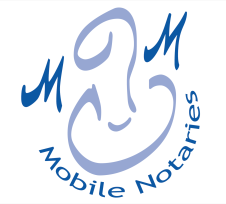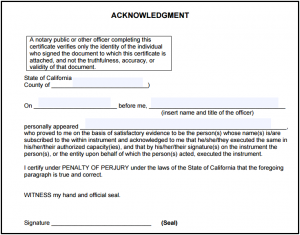Notary Definitions: A Glossary of Terms
ACKNOWLEDGMENT: a notarial certificate used to prove the identity of a document signer who has personally appeared before the Notary and has signed or acknowledged signing the document; the Certificate of Acknowledgment (shown below) must contain specific State-required wording.
ADVANCE HEALTH CARE DIRECTIVE: a document assigning someone to make health care decisions for another person (or specify treatment preferences) when he or she cannot make his or her own decisions
AFFIANT: one who swears or affirms something; a person who is sworn to an affidavit, or gives evidence by way of an affidavit or deposition
AFFIDAVIT: a voluntary declaration of facts, written down and sworn to or affirmed by the declarant (or affiant) before a Notary Public or other officer having the authority to administer an oath
AFFIRMATION: a solemn spoken pledge upon one’s personal honor, affirming the truthfulness of a statement
APOSTILLE: a certificate by the Secretary of State authenticating the signature and acting capacity (or position) of public officials on documents to be sent or used outside the United States
ATTORNEY IN FACT: a person who has received a Power of Attorney
allowing him or her to execute legal documents on behalf of
BENEFIT or INTEREST: indicates the possibility of financial gain or loss (or
COMMISSION: the authority issued by the California Secretary of State appointing a qualified person to be a Notary Public
COPY CERTIFICATION: a notarial act where the Notary makes and verifies a true and legally acceptable copy of an original document, such as Power of Attorney
CREDIBLE WITNESS: an impartial person with satisfactory evidence of identity appearing on behalf of a signer to establish the signer’s identity; unless the Witness is personally known by the Notary Public, two Credible Witnesses are required
DEED: a legal document transferring the title (or ownership) of real property from one person to another such as a Deed of Trust, a Deed of Reconveyance, or a Quitclaim Deed
DEPOSITION: an oral
EXECUTE or EXECUTING: to sign and complete a legal document
GLOSSARY: an alphabetic list of terms or words relating to a specific subject with explanations (or definitions)
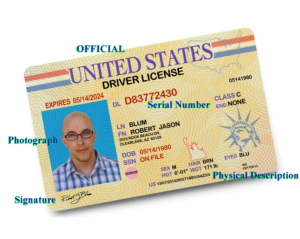 IDENTIFICATION: a Notary Public must reasonably establish the identity of each signer; according to the California Civil Code any one of the following items, if current or issued within 5 years, might be used for valid identification:
IDENTIFICATION: a Notary Public must reasonably establish the identity of each signer; according to the California Civil Code any one of the following items, if current or issued within 5 years, might be used for valid identification:
1. An identification card or driver’s license issued by the California Department of Motor Vehicles; or
2. A United States passport; or
3.
-
A passport issued by a foreign
government, provided that it has been stamped by the U.S. Immigration and Naturalization Service or the U.S. Citizenship and Immigration Services; -
A driver’s license issued by another state or by a Canadian or Mexican public agency authorized to issue drivers’ licenses;
-
An identification card issued by another state;
-
A United States military identification card with the required photograph, description of the person, person’s signature, and an identifying number;
-
An inmate identification card issued by the sheriff’s office or California Department of Corrections and Rehabilitation, if the inmate is in custody; or
-
An employee identification card issued by an agency or office of the State of California, or an agency or office of a city, county, or city and county in California.
JURAT: a notarial certificate
IMPARTIAL PERSON: one who has no beneficial interest in the document(s) being witnessed or notarized
NOTARIAL ACT: the prescribed behavior of a Notary Public in performing his or her duties, which includes scanning the document for fraud (no blanks allowed), reviewing or providing the notarial certificate specified by the document creator, and verifying the signer(s)’ identity, the date and venue (the state and county where notarization took place)
NOTARIAL CERTIFICATE: the State-specified wording which is part of, or attached to, a document to be notarized; the Acknowledgement, Jurat, and Copy Certification all have the venue (the state and county), the date, specific wording, the Notary’s signature
OATH: a solemn declaration, accompanied by a swearing to God, a revered person or thing, that one’s statement is true, or to be bound to a promise
PARTY TO THE INSTRUMENT or TO THE TRANSACTION: someone who is mentioned in the document (or the instrument) by name, job title or classification, or who would have
PERSONAL KNOWLEDGE: being familiar with an individual over sufficient time and through enough interaction to verify that person’s identity without reasonable doubt; since January 1, 2008, not an acceptable form of identification for almost all notarial acts
PERSONALLY APPEARED: the requirement for all forms of notarization that the document signer is physically present in front of the Notary – at the same time, and at the same place
POWER OF ATTORNEY: a document which empowers an individual (the attorney in fact) to act or sign on behalf of another individual (the affiant)
SATISFACTORY EVIDENCE OF IDENTITY: to verify someone’s identity a Notary Public requires
- At least one form of identification issued by the United States government, a state, or tribal government that contains an identifying number, the individual’s photograph, signature and a written physical description, including height, weight, and color of both hair and eyes; or
- The oath or affirmation of a Credible Witness, who personally knows
bothe the Signer and the Notary Public; or - The oath or affirmation of two Credible Witnesses, who personally know only the Signer
SIGNING AGENT: a Notary Public with expertise in dealing with real estate loan documents
SUBSCRIBING WITNESS: a person who will prove (under oath) that the document signer (or principal), who is unable to appear before a Notary due to unforeseen circumstances, is the person described in the document, and that the subscribing witness saw or heard the principal acknowledge signing the document
Sample Notary Forms
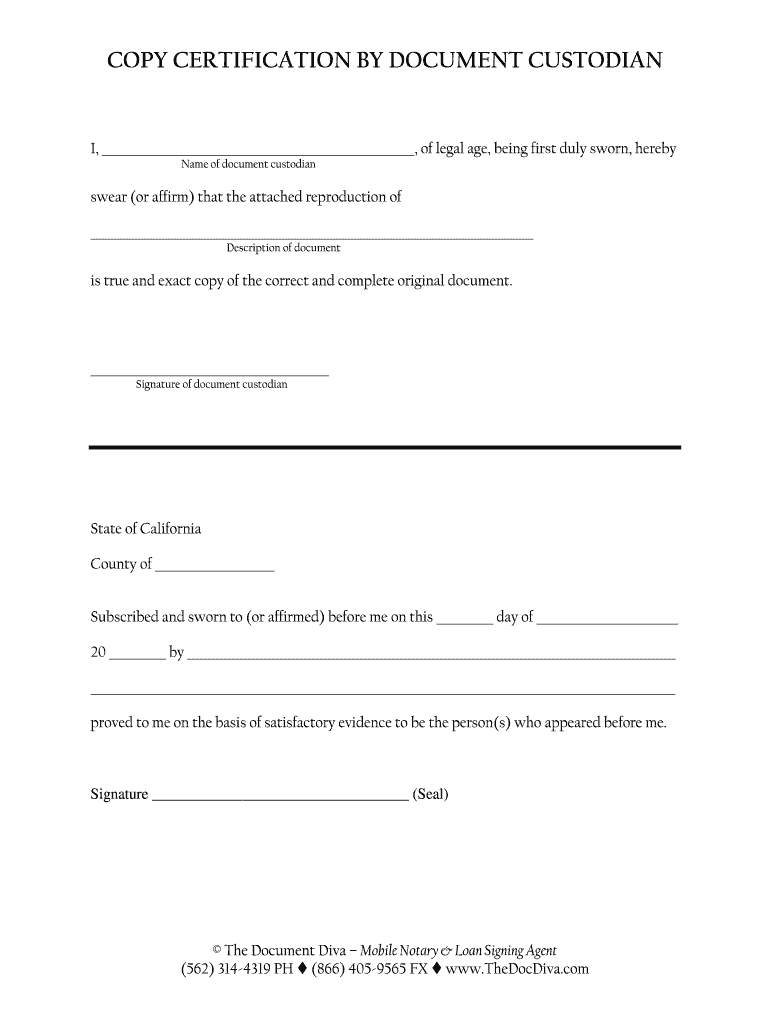
Copy Certification Form
A copy certification, such as the one above, can be used to verify that a document (such as a diploma) or a copy of a document is an accurate reproduction of the original – as sworn by the document custodian (such as the person in charge of the original document).
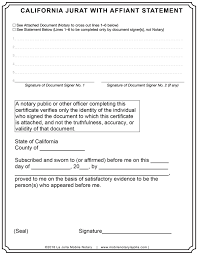
Jurat
Another frequently used notarial document is the JURAT (“It has been sworn” in Latin), which is used when someone is required to swear an oath or affirm the truth of the document. Also, the signer MUST sign the document in the presence of the notary and only at the time of notarization.
.
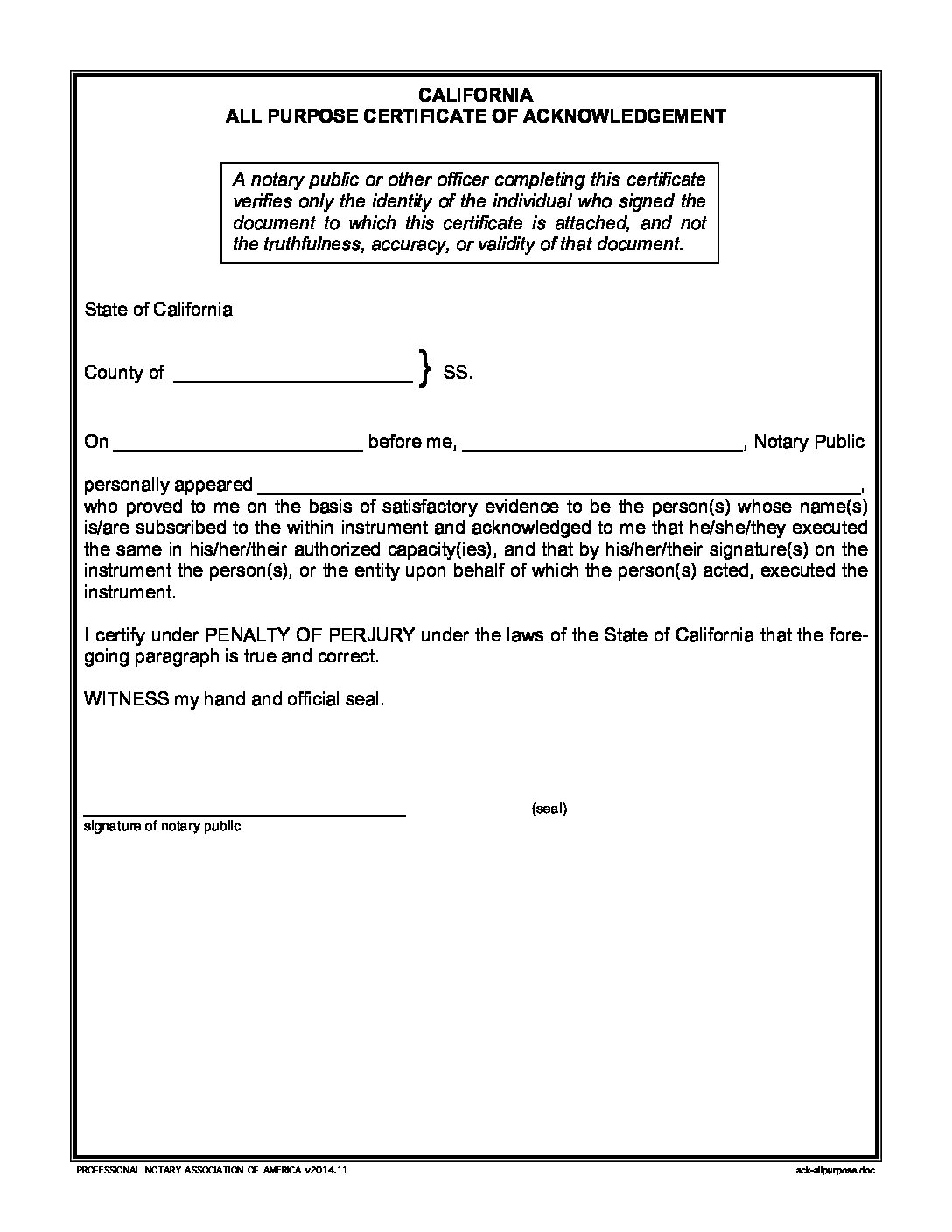
Acknowledgement
The ACKNOWLEDGEMENT is a notary’s most frequently used document (or wording on a document). The state of California requires particular formatting (such as the box around the “disclaimer”) and wording. Notaries need enough room for a solid imprint of their stamp without covering ANY printed material (including the word “SEAL”).
